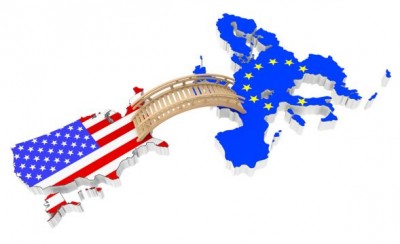Obama: TTIP Necessary So As to Protect Megabanks From Prosecution

On May 7th, Deutsche Wirtschafts Nachrichten, or German Economic News, headlined, “USA planen mit TTIP Frontal-Angriff auf Gerichte in Europa” or “U.S. Plans Frontal Attack on Europe’s Courts via TTIP,” and reported that, “America’s urgency to sign TTIP with Europe has solid reason: Megabanks must protect themselves from claims by European investors who allege that they were cheated during the debt crisis. … The U.S. Ambassador to Italy has now let the cat out of the bag on this — probably unintentionally.”
In this particular case, the megabank that’s being sued isn’t American but German, Deutsche Bank, which the U.S. Ambassador to Italy has cited as his example to defend, perhaps so as to appeal to Germans to protect their megabanks against lawsuits from foreign investors (such as Italians) who complain. In that case it was investors in the Italian city of Trani, population 53,000. The smallness of the city was an issue the Ambassador raised against the suit’s having been brought there.
Reuters headlined on May 6th, “Italian prosecutor investigates Deutsche Bank over 2011 bond sale”, and reported that, “An Italian prosecutor is investigating Deutsche Bank (DBKGn.DE) over its sale of 7 billion euros ($8 billion) of Italian government bonds five years ago, an investigative source told Reuters. A prosecutor in Trani, a town in southern Italy, is investigating because Deutsche Bank allegedly told clients in a research note in early 2011 that Italy’s public debt was no cause for concern, and then sold almost 90 percent of its own holding of the country’s bonds.” The U.S. bond-rating agencies are also subjects in this suit, because Trani had relied upon their ratings of those bonds.
The Obama Administration (through its Italian Ambassador) seems thus to be saying, in effect, that unless TTIP is passed into law, Europe’s megabanks (and the U.S. bond-rating agencies, S&P, Moody’s and Fitch) will be able successfully to be sued by cheated investors, just as has been happening with such American banks as JPMorgan/Chase and Goldman Sachs in the United States, which — since TTIP hasn’t yet been in force anywhere, including in the U.S. — were forced to pay billions to cheated investors. Apparently, Obama would be happier if those suits had been impossible in the U.S. The argument here, though only implicitly, seems to be that TTIP is the way to protect megabanks and the bond-rating firms. It concerns specifically the selling of sophisticated derivative investments.
If this is the argument behind the remarks by Obama’s Italian Ambassador, John Phillips, he’s obliquely warning Europeans that unless TTIP gets signed, their megabanks might similarly be forced to pay billions to investors who were cheated. As quoted by Reuters, he said that, in the U.S., it’s “highly unlikely that such a case would be brought outside the major financial centers, where prosecutors have both jurisdiction and expertise in securities fraud prosecutions,” and that megabanks need the protection that’s provided by such prosecutors, since they possess “expertise in securities fraud prosecutions.” Phillips was clearly implying that small-city prosecutors (such as are allowed to prosecute such cases in Europe) aren’t such “experts,” as are needed in order to protect the megabanks. Reuters characterizes Phillips’s argument as asserting, “Italy’s justice system was deterring investors.” However, no clarification of the meaning of that statement was provided by Reuters.
DWN alleges that under the TTIP such a court-issue would probably not even have been raised but would simply have ended before an arbitration panel, in which the aggrieved investors exert no influence and where it would be almost impossible for these investors’ rights to be protected.
Another example is cited, where the German city of Pforzheim successfully sued, at the Federal Court of Justice, the U.S. megabank JPMorgan/Chase, and where that court allowed Pforzheim to seek “accumulated damages of 57 million euros.”
Under TTIP, a megabank fined this way might in turn sue the nation’s taxpayers to restore the megabank’s ensuing loss of profits. If the cheated investors win, taxpayers might thus end up bearing the cheated investors’ losses. Under TTIP, the fined company would be arguing that the law under which it had been fined is in violation of TTIP and thus constitutes a violation of that treaty, so that the violating government is obliged to be paying the fine — the law against fraud would itself be violating the fined company’s rights. If the three-arbitrator TTIP panel rules in the megabank’s favor, the government would need to pay the fine it had assessed against the bank, and no appeals court exists for any of these arbitration-panels’ rulings — these rulings are final. Obama and other proponents of that system, which is calledISDS for Investor State Dispute Settlement, say that it’s a more efficient way of handling such disputes. In international commercial affairs, it not only eliminates appeals courts, it gradually eliminates democracy, by fining the government into ultimate submission to these three-person panels of international-corporate-
On the same basic idea, Benito Mussolini was praised for “making the trains run on time.”
Investigative historian Eric Zuesse is the author, most recently, of They’re Not Even Close: The Democratic vs. Republican Economic Records, 1910-2010, and of CHRIST’S VENTRILOQUISTS: The Event that Created Christianity.

